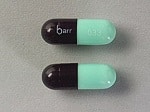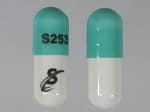Librium® Overview
Librium®, or chlordiazepoxide, the generic name for Librium®, is used to treat acute alcohol withdrawal symptoms and anxiety. Before surgery, it is often used to reduce anxiety and fear.
What is Librium®?
Librium®, or chlordiazepoxide, the generic name for Librium®, is a prescription medication. It can be used alone or in combination with other medications to get the desired effect. Librium® is mainly used to aid in alcohol withdrawal and anxiety.
Is Chlordiazepoxide a Benzo?
Librium® or chlordiazepoxide, is a member of the benzodiazepine pharmacological class, which acts on the brain and central nervous system to provide a calming effect. It functions by boosting the body’s natural chemical effects (GABA).
Is Librium® Safe to Take?
Only take Librium® as directed by a doctor. It is generally safe to take this drug when following the instructions on the bottle and only with a prescription. There are several drug interactions when taking Librium®. Some include anti-depressants, antacids, and sodium oxybate.
It’s important to note that Librium® can become addictive. Do not take this drug without a prescription, and try natural alternatives when possible.

Librium® Uses
Read all drug guidelines or instruction sheets and adhere to the instructions on your prescription label. Never take Librium® in excess of the recommended dose or for longer than advised. If you experience a stronger desire to use more Librium®, let your doctor know.
Pain
Librium® acts as a sedative and can be used as a muscle relaxant. Therefore, sometimes a doctor may recommend using Librium® for pain relief.
Depression
Librium® for depression is not its intended use. Since Librium® may increase depression with suicidal intentions, it shouldn’t be used alone to treat depression or anxiety that is connected with depression.
Anxiety
Librium® for anxiety is one of the main uses of this drug. The effects of anxiousness are temporarily alleviated by taking it. It alters how some brain cells receive messages from other brain cells through a process known as neurotransmission.
Doctors may give Librium® to their patients when they feel anxious about an upcoming surgery. It relaxes the patient enough to calm them. Due to this reason, Librium® has a high chance of misuse or abuse.
Panic Disorder
Because Librium® acts quickly, people with panic disorders are frequently prescribed this medication. Librium® for panic attacks works to calm the person quickly, provoking a more relaxed demeanor.
Librium® For Alcohol Withdrawal
Alcohol withdrawal can be a very dangerous process. When weaning off of alcohol, some people may be prescribed medications to lower the hazards they confront.
Librium® for alcohol withdrawal helps by reducing the number of unpleasant symptoms that accompany alcohol withdrawal. Librium® helps with anxiety and insomnia.
Please note: Someone who has a history of alcohol abuse has altered their brain chemistry to handle the depressive side effects of heavy drinking. Suddenly disturbing that equilibrium may be hazardous.
If you are experiencing alcoholism and want to quit drinking, It is a good idea to go to a detox clinic rather than detox at home. There, you might be given a variety of drugs, such as Librium®, to treat alcohol withdrawal.
Librium® vs Ativan® for Alcohol Withdrawal
Librium® and Ativan® are both used to treat alcohol withdrawal. Both medications come with a series of side effects.
| Side Effects | Librium® | Ativan® |
| Sedation | X | X |
| Anti-Anxiety | X | X |
| Changes in Sexual Interest | X | |
| Changes in Appetite | X | |
| Drowsiness | X | X |
| Constipation | X | X |
| Blurred Vision | X | X |
Librium® Dosage
Depending on a person’s condition and reason for use, Librium® dosage may vary.
 |
 |
 |
| 5mg | 10mg | 25mg |
| Prescribed for:
Mild Anxiety Geriatric Patients Preoperative Apprehension |
Prescribed for:
Moderate Anxiety Preoperative Apprehension |
Prescribed for:
Severe Anxiety Preoperative Apprehension right before surgery Alcohol Withdrawal |
Librium® Side Effects
General side effects of Librium® include:
- Drowsiness
- Sleepiness
- Vomiting
- Swelling
- Blurred Vision
- Headache
- Irregular menstrual periods
- Dizziness
- Constipation
More serious side effects may occur. Notify your doctor if you experience:
- Depression
- Hyperactivity
- Slurred speech
- Trouble balancing
- Confusion
- Sleep disturbances
- Changes in sex drive
- Jaundice
Barbiturates, blood thinners, MAO inhibitors, medications for psychiatric illnesses, opioids, or antidepressants may interact with Librium®. Inform your physician of all medications you use.
Librium® Withdrawal Symptoms
Withdrawing from Librium® can be uncomfortable. Depending on a number of variables, including how much, for how long, and how Librium® was administered, symptoms might range from mild to severe.
Librium® withdrawal symptoms may include:
- Increased anxiety
- Sensory overload
- Vomiting
- Sweating
- Hallucinations
- Elevated heart rate
- Irritability
- Depression
- Drug cravings
- Psychosis
- Tremors
- Memory loss
- Insomnia
How to Detox From Librium®
After only a few weeks of continuous usage, the habit-forming benzodiazepine Librium® can cause dependency and addiction. Like all benzos, Librium® increases the brain’s production of the neurotransmitter GABA, which results in sensations of tranquility and relaxation. The user’s brain eventually grows dependent on Librium® to feel this way.
The patient’s brain will continue to create calming neurotransmitters if they abruptly stop using Librium® after becoming addicted or tolerant to it; however, they won’t experience their effects as strongly. Aside from a number of additional Librium® withdrawal symptoms, the user will start to feel anxious, and their blood pressure and pulse rate will rise.
If you or someone you know is working to detox from Librium®, you must seek medical help due to potential life-threatening effects.
Librium® Detox Timeline
The Librium® detox process takes around two weeks. Some side effects may linger for a month or more.
Day 1-3: As the body struggles to rid itself of toxins and regain equiLibrium®, the first three days will show the most severe withdrawal symptoms. Fatigue, headaches, nausea, dizziness, irritability, insomnia, and in more severe cases, paranoia or psychosis are common symptoms during the first few days.
Day 4-7:After the initial intense withdrawal symptoms, each day should get better. Some cravings may linger around these days.
Second Week: The majority of the physical withdrawal symptoms should have subsided by the second week without Librium®, although some psychological ones may continue. Trouble sleeping and mood changes are frequent concerns during the second week.
Third and Fourth Week: The body should be fully clear of Librium® by the end of one month, and one is likely to be symptom-free. However, some individuals may experience persistent cravings for the medication for months because they have developed a strong psychological dependence on it. Long-term substance misuse support is therefore advised.
Librium® Overdose Symptoms
Librium® overdose is a serious problem if it occurs. Look for these signs and symptoms if you suspect a Librium® overdose:
- Nodding off
- Shallow breathing
- Uncoordinated movements
- Blue nails or lips
- Blurry vision
- Stomach pain
- Poor reflexes
- Memory loss
- Tremors
- Difficulty urinating
If you or someone you know is showing symptoms of a Librium® overdose, seek medical attention immediately.
Is Librium® Addictive?
Librium® is a benzodiazepine, which is known to be highly addictive. It can result in misuse even by those who are prescribed this medication for medical purposes.
Never take Librium® without a prescription, and never take more than prescribed.
Librium® Addiction Treatment & Rehab Options
Addiction to benzos like Librium® is not a life sentence. If you or someone you know is addicted to Librium®, there are options. Librium® addiction treatment is available to help you safely wean off the drug and develop stronger coping mechanisms for anxiety and avoiding alcohol.
Medically assisted detox within a Librium® rehab is the best way to overcome this disease.

Librium® Frequently Asked Questions
Here are some answers to frequently asked questions about Librium®.
While Librium® and Xanax® are both benzodiazepines used to treat anxiety, they are not the same thing.
Librium® is mainly used for alcohol withdrawal within a detox setting. Xanax® is mainly used for anxiety and panic disorders.
Both are highly addictive.
Long-acting benzodiazepines Librium® and Valium® have many things in common, as well as some significant things that set them apart. Both Valium® and Librium® are sedative pharmaceuticals that fall under the benzodiazepine pharmacological class.
A safe and alternative substitute for both drugs is valerian root. It has calming qualities similar to those of benzodiazepines but does not bind to the same receptor sites.
Prior to knowing how Librium® will affect you, avoid driving or engaging in other risky activities. Drowsiness or vertigo might result in slips, trips, or serious injuries.
Librium® can be quite addictive. The medicine is normally only suggested for short-term use because it is habit-forming.
The liver breaks down Librium® and excretes it in the urine. Your liver’s ability to filter drugs will be hampered if it is compromised in any manner. This may cause differences in the half-life of the medication.
Although most liver issues resolve once the user quits misusing the substance, Librium® can harm the liver or impair liver function. If a person already had liver damage, particularly damage caused by excessive alcohol consumption, the damage was more likely to become permanent.
If you drastically cut your dosage or stop taking Librium® altogether after taking it for medicinal or recreational reasons for longer than a few weeks, you may experience withdrawal symptoms.
The onset of withdrawal symptoms shows that your body has become accustomed to the drug’s presence in your system and now depends on it to function. Your body may struggle to adjust swiftly if you abruptly remove that substance from your system.
Recover From Librium® Addiction
There is dignity in healing. If you are struggling with addiction, know that you aren’t alone. At Gallus, we are here to help. Contact us today.
